Rushden Echo & Argus, 31st May, 1940, transcribed by Jim Hollis
Rushden Soldier Wounded - Town’s First Army Casualty Now Back in England
Visited By Sweetheart
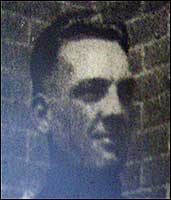 |
|
L/Cpl A E Cross
|
Rushden’s first Army casualty of the present war is Lance-Corporal Albert Edward Cross, eldest son of Mr. and Mrs. A. A. Cross, “Elbrita,” Hall-avenue, Rushden.
An official communication which was received by his parents stated that Lance-Corporal Cross was in a military hospital suffering from a gunshot wound. Yesterday his fiancée, Miss Doreen Munn, of High-street, Higham Ferrers, visited him. “I’m glad to be back in England,” he told her.
The wound from which he is suffering is in his left arm and was caused, he believes, by a sniper.
Lance-Corporal Cross joined the Army nearly a year before the war broke out. Before then he was a finisher in the Newton-road factory of Messrs. John White Ltd.
A native of Irthlingborough, he came to Rushden when ten years old, and he was educated at Alfred-street School. Before leaving Rushden he was a popular member of the Adult School Male Voice Choir.
|
The Rushden Echo and Argus 7th June 1940, transcribed by Jim Hollis
Local Soldiers Return from The Flanders “Trap” - Two Rushden Officers Meet on Beach
3 Men Wounded - Brothers Among Those Now Safe In England
News of Rushden and Higham Ferrers soldiers returning from the Flanders battlefield has been received almost daily during the past week. It is already apparent that the wonderful work of evacuation in the Dunkirk region has saved most of the local “boys” who advanced into Belgium and were left in a perilous position by the surrender of the Belgium Army on the order of King Leopold.
At least three men were wounded, and other unfavourable news may yet be received, but the position as recalled up to the present exceeds the most optimistic expectations.
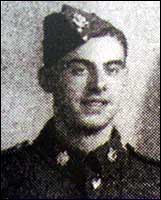 |
|
L/Cpl Farrington
|
Three shrapnel wounds in the left leg were received by Lance-Corporal Ronald Farrington, who is the eldest son of Mr. and Mrs. F. Farrington, 55 Little-street, Rushden, and has a young wife living in Roberts-street.
Now in a military hospital, L/Cpl. Farrington was visited by relatives on Saturday evening, when they found him quite cheerful. He told them the story of his adventures, beginning when he entered Belgium with the first few thousand British soldiers. It was not long before he was in Brussels, but after that he and his comrades were forced back, fighting magnificently all the time. Bombed and pounded by German artillery day after day, he had not a minute’s sleep until reaching the security of England.
When in Rushden L/Cpl. Farrington was one of the most popular members of the St. Mary’s Rover Scouts. He attended St. Mary’s Church regularly, and he and his wife have been Sunday School teachers there. For eight years he was in the church choir.
Formerly employed as a clerk at the L.M.S. railway station, he moved to the Corby station before joining the Territorial Army last August. He was married when home on leave last October.
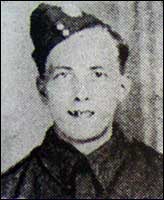 |
|
Pte. A. Gordon
|
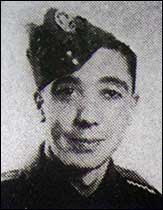 |
|
Pte. Jack Throssell
|
One of the First Four
One of Rushden’s first four Militia-men, Pte. Albert Gordon, of 149 Irchester-road, has severe shrapnel wounds in the chest and left leg. These were received when the battle in Belgium was raging, and he is now undergoing treatment in an English military hospital.
A native of Raunds, he was educated there, and is the only son of Mr. and Mrs. J. Gordon. Before being called up he was a boot operative in Messrs. John White’s Newton-road factory. His age is 21 years.
A Higham Ferrers soldier who was formerly a popular factory cricketer, Pte. Jack Throssell, of 67 Wharf-road, is in a military hospital in the North of England. Married less than a year ago, he is the second son of Mr. and Mrs. T. W. Throssell, 25 Glassbrook-road, Rushden.
Pte. Throssell is suffering from a leg wound received in action. He wrote home recently to say that he had been constantly in action for a fortnight and had not had his boots off his feet for that period.
An old boy of Rushden Alfred-street and Intermediate Schools, he was employed in the lasting department of Messrs. John Cave and Sons before being called up last October. While in his home town he played in his factory’s cricket team and was a useful batsman.
Among those who escaped uninjured were two Rushden Army officers who met on a Flanders beach last week – their first contact for a long time – and are now safely in England. One is 2nd-Lieut. W. J. Allen, Royal Engineers, son of Councillor J. Allen, J.P., Chairman of the Rushden Urban Council. His parents received a wire last Saturday stating that he had reached a South Coast port.
The other is Lieut. Alfred Perkins, Royal Artillery, son of Mrs. B. Perkins, of Wymington-road, Rushden, and the late Mr. Leonard Perkins, for many years headmaster of Rushden Intermediate School. Lieut. Perkins is on the staff of a technical school at Norwich, where his wife resides.
One of the first Rushden lads whose safe return to England was notified was Pte. Dennis R. Cooper, of 57, High-street South, Rushden, a member of the R.A.S.C. He is a member of the Rushden Congregational Church – where the good news was announced on Sunday – and belongs to the Post Office staff at Wellingborough.
Two Rushden brothers who got away are Pte. Robert Richardson, who lived with his sister, Mrs. E. Nurrish, at 7, Pemberton-street, and Pte. Richard Richardson, who left Rushden for London before joining the Army.
Pte. George Dowsett, youngest son of Mr. and Mrs. E. Dowsett, 57, Sartoris-road, Rushden, has written home and described his terrible experiences before being evacuated from Dunkirk.
Another lucky survivor is Pte. Clifford William Homan, youngest son of Mr. and Mrs. A. E. Homan of 103, Trafford-road, Rushden. Brief messages received by his parents state that he landed in England during the week-end.
Pte. R. D. Hill (Northamptonshire Regt.), of Higham Ferrers, has ‘phoned his wife to report his safe return to Great Britain from service abroad. He says he is in good health although in one operation he stood waist deep in water while bombs were falling.
Driver L. Waite (R.A.S.C.), of 32 Highfield-road, Rushden, is another local soldier who has written to his relatives to say that he is safe back in England.
“The sights I have seen I never want to see again,” wrote L/Cpl. Clifford Dickens. Aged 24 years, L/Cpl. Dickens is the fourth son of Mr. and Mrs. J. Dickens, 4 Trafford-road, Rushden. His adventures included a walk of 17 miles to Dunkirk before being evacuated, and also witnessing the complete destruction of Armentieres by the Germans.
Corporal Ernest Denton, youngest son of Mrs. Denton and the late Mr. Sam Denton, 84 Highfield-road, Rushden, writes : “Thank the Lord I am safe and sound in England.”
The wife of Gunner Frederick Osborne, 80 Highfield-road, Rushden, learned on Tuesday that her husband had been conveyed to England from Dunkirk, and though unhurt he was very tired.
A very brief message received by Mr. and Mrs. C. Bayes, of 123 Irchester-road, Rushden, indicated that their only son, Pte. Arthur Bayes, had arrived in England safely.
One of the first to leave Belgium was Ernest Rawlins, 77 Duck-street, Rushden, of the R.A.F. ground staff. He was lucky enough to be able to spend a few hours with his wife and two children recently.
News was received on Tuesday that Pte. Leonard Childs, whose wife resides at 71 Trafford-road, Rushden, is in England and well. Pte. Childs is the second son of Mr. and Mrs. Childs, 26 Kings-road, Rushden.
|
The Rushden Echo and Argus, 14th June 1940, transcribed by Gill Hollis
Bombed on Land and Sea - Rushden Soldier in the Retreat from Flanders
Several Rushden soldiers who were evacuated from Flanders have been home on leave during the last few days. Among them – looking remarkably well – was Pte. Dennis Cooper, of High-street South, who told a typical story of British endurance.
Advancing a short distance into Belgium with his R.A.S.C. unit, Pte. Cooper was behind the actual fighting line, but when the march for the coast began he passed through several areas which were being shelled or bombed. His party sheltered safely in cellars during a series of air raids on a small French town.
When the troops reached Dunkirk the Germans were bombarding it from land and air, and the town was in “smithereens,” with shell holes and bomb craters everywhere.
After one afternoon at Dunkirk Pte. Cooper embarked on a steamer without difficulty. Soon afterwards the ship was attacked by aeroplanes but escaped undamaged, though one bomb fell close and made the vessel rock.
|
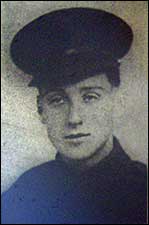 The Rushden Echo and Argus, 21st June, 1940, transcribed by Gill Hollis The Rushden Echo and Argus, 21st June, 1940, transcribed by Gill Hollis
Rushden Soldier A Prisoner - Previously on “Missing” List.
Recently listed as “missing,” Pte. Ernest Harper, of Rushden, has now sent home to say that he is a prisoner. He was last heard of in Belgium on May 18th.
Pte. Harper has a young wife, whom he married three months ago when on leave. Aged 22, he joined the Army last September and was previously in the employ of Messrs. Walter Sargent and Co., residing with Mrs. E. Surridge, of Brookfield-road, Rushden.
|
The Rushden Echo and Argus, 21st June, 1940, transcribed by Gill Hollis
How They Fought To Dunkirk - Rushden Soldier’s Moving Story of British Bravery
An amazing story of the courage and endurance shown by the British soldiers in Belgium has been told to an “Echo and Argus” reporter by Private Walter Bass, of Rushden. Pte. Bass, who was called up with the first batch of Militiamen, is the third son of Mr. and Mrs. W. Bass, of 38 Crabb-street, Rushden.
“We were guarding a pillbox on the French frontier,” he said, “when Hitler marched into Belgium. As soon as the Germans had begun to enter Belgium there were huge air raids on our positions, and we were told to be ready to move at short notice.
“Orders came to shift to Belgium, and we went right through to the other side of Brussels. We had a good time to start with, and the Belgians gave us plenty of beer and champagne. We were billeted in farms at first, and after that we had to take up positions on the Albert Canal while R.E.’s blew bridges up. At this time there was some shell-fire in progress.
Fighting To Coast
“When we had finished there we came back to a place near the Franco-Belgian frontier, marching most of the way. One day our breakfast consisted of nothing more than a biscuit and a cup of coffee. For two or three days we were billeted in a brewery which the Germans started shelling. Two hours after leaving the building it was blown to pieces.
“Then came the order to get to the coast. We were told we might have to fight our way. At a place near Ypres we took up positions in a wood under considerable shell-fire. There was one German reconnaissance plane above us directing the enemy artillery, and later our own guns caused us some trouble.
“We shifted during the night, in a lorry, and got lost. Entering a village, Jerry got our position and sent us out again. We then kept marching on, fighting a rearguard action all the time. Lorries took us nearly to Dunkirk, and just as we arrived, a five-hour bombing raid started. Two of us lost our company and joined up with some ambulance people. For two days we helped with the wounded.
Dunkirk in Ruins
“As we left in a small cargo boat we saw that Dunkirk was in ruins. A heavy black cloud overhung the town, and every now and then a plane dived out.”
Despite these experiences, Pte. Bass looks little the worse for his adventures. “I shall know what to do next time” he remarked.
Before he left Rushden, Pte. Bass was employed in Messrs. John White’s Newton-road factory. He was the popular Assistant Scoutmaster of the St. Mary’s Boy Scout Troop and was a member of St. Mary’s Institute.
|
The Rushden Echo and Argus, 28th June 1940, transcribed by Gill Hollis
Rushden Soldiers “Missing” - Young Men Who Fought on the Continent
Four more Rushden soldiers – all very well known in the town – have been listed as “missing” after the battles in France and Flanders, but in view of the confusion which prevailed behind the lines at the time of the fighting their relatives are sustained by the hope that they may have been taken prisoner.
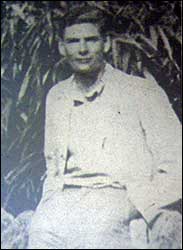 |
|
Pte Kenneth Kirk
|
Formerly a popular assistant at Messrs. Abington and Sons’ outfitting shop in High-street, Rushden, Pte. Kenneth Edward Kirk (21) is one of the missing.
The third son of Mr. and Mrs. J. B. Kirk, of 41 Park-avenue, Rushden, (who received the official news on Monday), he was born at Higham Ferrers and attended Rushden Intermediate School. He joined the Northamptonshire Regiment last autumn and went to France in February.
Pte. Thomas J. King, the second son of Mr. and Mrs. W. King, 15 Trafford-road, sent a field card home three weeks ago, when he was serving in France, and the news that he is missing arrived on Monday.
Pte. King was born at Rushden, attended the Newton-road School, and joined the Regular Army in 1938. During his military training he won a silver spoon and silver cup for shooting. He has a fiancée, Miss Margaret Hone (lately in service with Dr. M. J. Cotter), and one of his brothers is serving as a soldier in the East.
Before joining the Army Pte. King was employed by the Coxton Shoe Co. and was well known to many people as a “Football Telegraph” salesman.
A third missing soldier of the Northamptonshire Regiment is Pte. Edward Ernest Bryant, youngest son of Mr. and Mrs. C. W. Bryant, of 86 Cromwell-road, Rushden. The last field card received from him was dated May 15, when he was in France.
Twenty-two years of age on June 9, Pte. Bryant enlisted last July with the first batch of Militiamen. He played football for Rushden Intermediate School and Rushden Adult School (at centre-forward), was employed by Messrs. T. Swindall and Sons, builders, and is on the membership roll of the Athletic Club.
Mr. and Mrs. Harry Hall, of 65 Oakley-road, Rushden, and late of 127 Finedon-road, Irthlingborough, were notified on Saturday that their son, Pte. Francis Bert Hall, of the Northamptonshire Regiment, is listed as “missing.”
|
The Rushden Echo and Argus, 5th July 1940, transcribed by Jim Hollis
More Soldiers on “Missing” List - Rushden Sgt.-Major Probably Captured at St. Valery
Further Rushden soldiers who were serving in France have been posted as “missing” during the last few days. Detailed information was not available at the time of notification but one of the men was among the British and French units which were surrounded at St. Valery, and may therefore be a prisoner.
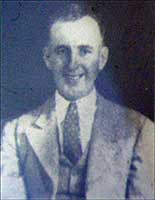 |
|
Battery Sgt Major Fennell
|
The probable prisoner is Battery Sgt.-Major Leonard James Fennell, Royal Artillery, second son of Mr. and Mrs. James Fennell, 155, Newton-road, Rushden.
B.S.M. Fennell is unmarried. He joined the Army 11 years ago and has served in Egypt and Palestine. The last communication from him was a field card dated May 28, but a letter received by his parents from regimental headquarters last Saturday says that he is probably an unharmed prisoner of war, taken, in company with many of his comrades, in St. Valery on the morning of June 12. From what is known, he was there, and perfectly fit and well, when some thousands of British and French were taken by the enemy.
Lce-cpl. Wilfred A Leach, aged 33, of the Northamptonshire Regt., is reported “missing” after the recent battles in France and Belgium.
Lce-cpl. Leach was formerly at Irthlingborough, where he worked for Messrs. Bayes and Co. and belonged to the St. John Ambulance Brigade. He spent seven years in the Regular Army, serving most of the time in India, and then went into the Reserve, being recalled to the colours last June. He married Miss Alma Keys, of 5 Ealing-terrace, Rushden, on October 9 last year, and was home on leave from France in February. The last field card received by his wife was dated May 19.
Lance-Bombardier Raymond Denny, Royal Artillery, is officially reported as “missing prior to June 19.” Aged 29 years, he is the third son of Mr. Thomas Denny, 53 Oakley-road, Rushden. His wife, formerly Miss Phyllis Tuckey, of Irchester, resides at 17 St. Peters-avenue, Rushden.
The missing soldier served in the Regular Army for three years and had been on the Reserve eight years before being recalled to the colours last August. In civilian life he worked for Messrs. John White, Ltd., Higham Ferrers. He has served in France since January, and the last communication from him was dated May 16.
|
The Rushden Echo and Argus, 2nd August, 1940, transcribed by Gill Hollis
Rushden Boys in Prison Camps
News of Soldiers Previously Reported Missing - One Named On Radio
News was received during the weekend that a number of local soldiers who had previously been reported missing were now known to be prisoners of war.
A former well-known Irthlingborough Thursday footballer, Pte. Francis Bert Hall, has been reported a prisoner of war, news being received by his parents, Mr. and Mrs. H. Hall, 65 Oakley-road, Rushden on Saturday. Pte. Hall formerly resided at 127 Finedon-road, Irthlingborough, and he was one of Irthlingborough’s first Militiamen. He is unmarried and before joining the Army was employed at Burton’s Stores, Finedon.
Formerly a popular assistant at Messrs. Abington and Sons’ outfitting shop in High-street, Rushden, Pte. Kenneth Edward Kirk (21) is one of the prisoners and has been sent to the camp at Stalag.
The third son of Mr. and Mrs. J. B. Kirk, of 41 Park-avenue, Rushden, he was born at Higham Ferrers and attended Rushden Intermediate School. He joined the Northamptonshire Regiment last autumn and went to France in February.
Pte. Thomas J. King, the second son of Mr. and Mrs. W. King, 15 Trafford-road, is also a prisoner.
Pte King was born at Rushden, attended the Newton-road School, and joined the Regular Army in 1938. During his military training he won a silver spoon and silver cup for shooting.
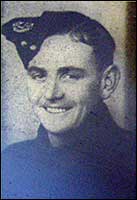 |
|
Pte E E Bryant
|
One of his brothers is serving as a soldier in the East.
Before joining the Army Pte. King was employed by the Coxton Shoe Co. and was well-known to many people as a “Football Telegraph” salesman.
Another prisoner at Stalag is Pte. Edward Ernest Bryant, youngest son of Mr. and Mrs. C. W. Bryant, of 86 Cromwell-road, Rushden.
 |
|
Pte Ernest Harper
|
|
Twenty-two years of age on June 9, Pte. Bryant enlisted last July with the first batch of Militiamen. He played football for Rushden Intermediate School and Rushden Adult School (at centre-forward), was employed by Messrs. T. Swindall and Sons, builders, and is on the membership roll of the Athletic Club.
Rushden was mentioned by one of Hitler’s English radio announcers on Sunday night when the name of Private Ernest Harper, of 93 Westfield-avenue, Rushden, was given out in the list of British prisoners of war which is broadcast from Germany every day.
It was on June 6 that a telegram brought news to Mrs. Eva Harper that her husband, to whom she was married only three months previously, had been reported missing since May 18, when he was in Belgium. About a fortnight later she was informed that he was a prisoner of war.
|
The Rushden Echo & Argus, 9th August 1940, transcribed by Gill Hollis.
At Stalag Camp - Rushden Sergt-Major Taken Prisoner at St. Valery
The belief the Battery Sgt.-Major Leonard James Fennell, of Rushden, had been taken prisoner during the last stages of the fighting in France is now confirmed by an official notification that he is at Stalag Camp, where other Rushden soldiers have been lodged by the Germans.
Second son of Mr. and Mrs. James Fennell, 155, Newton-road, Rushden, B.S.M. Fennell is unmarried. He joined the Army 11 years ago and has served in Egypt and Palestine. He sent a field card on May 28th and was known to be at St. Valery with his Royal Artillery unit when thousands of British and French were surrounded there on June 12th.
|
The Rushden Echo & Argus, 23rd August, 1940, transcribed by Gill Hollis
“Lancastria” Survivors - Two Rushden Soldiers Were In French Coast Disaster
It may now be disclosed that two Rushden soldiers were among those on board the “Lancastria” when she was bombed and sunk by German ‘planes off the French coast several weeks ago.
One of them was Pte. Harry Pack, only son of Mr. and Mrs. F. A. R. Pack, of 17 Gordon-terrace, Higham-road, Rushden. For several hours Pte. Pack, who is a good swimmer, was swimming among the oily water, and as he did so he kept a Belgian lady afloat. They were picked up by a tug and then transferred to a destroyer which landed them at a South Coast port.
The other man is Driver Jim Barker, only son of Mr. and Mrs. F. Barker, 45 Harborough-road, Rushden, who was picked up by a destroyer. Though he saw his parents soon after the incident he said nothing about the sinking until it was officially announced by the Admiralty.
|
The Rushden Echo & Argus, 30th August 1940, transcribed by Gill Hollis
News of Prisoners - Rushden Men Write Home from Germany
Postcards from at least two of the soldiers who are prisoners of war in Germany were delivered to Rushden homes on Thursday afternoon. One was from Pte. Arthur H. Cox, of 18, Upper Queen-street, whose mother did not know until last Saturday that he was alive in enemy hands. Pte. Cox writes from Stalag, and says he is “quite all right.”
Battery Sergeant-Major L.J. Fennell sends to his home at 155, Newton-road, stating that he is well and will write a letter in the course of a week or two.
|
The Rushden Echo and Argus, 6th September 1940, transcribed by Jim Hollis
Another Prisoner - Rushden Corporal Writes Home from Germany after Two Months
Yet another missing Rushden soldier has been accounted for. Corporal Ernest Arthur Edwards, of 37, Hall-avenue, is a prisoner at the Stalag camp in Germany and has himself sent the first intimation of his safety to his young wife.
On July 3rd Mrs. Edwards was notified by the War Office that her husband had been missing since May 10th and the ensuing two months brought no further tidings. Then, on Monday, came the card from Stalag.
Corporal Edwards was employed before the war at the Higham Ferrers office of Messrs. John White, Ltd.
|
The Rushden Echo and Argus, 6th September, 1940, transcribed by Jim Hollis
News from Germany - More Messages Received in Rushden from War Prisoners
Several Rushden soldiers additional to those mentioned last week have got messages through from the prisoner-of-war camps in Germany.
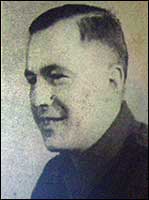 |
|
Pte F B Hall
|
For three days in succession (Thursday, Friday and Saturday of last week) the postman brought communications from Pte. F. B. Hall, whose home is in Oakley-road, Rushden. In all, three cards and a letter were received. Pte. Hall says he is well, but would like a parcel. He sends best wishes to all friends.
Pte. T. King, of 15, Trafford-road, is well, but would like some work to do, and Pte. E.E. Bryant, of 86, Cromwell-road, says he is in the best of health.
A letter for his mother and one for his sweetheart, Miss M. Wheeler, came from Pte. Kenneth Kirk, whose home is in Prospect-avenue, Rushden. – the first communications from him since he fell into German hands at Ypres on May 28th.
Pte. Kirk writes that his food is rationed, but he gets plenty of exercise and is well and happy. Before joining the Army he was in Messrs. Abington’s outfitting shop at Rushden.
|
The Rushden Echo and Argus, 13th September, 1940, transcribed by Jim Hollis
Hope Rewarded - Rushden Wife Receives Messages from Husband in German Camp
Though she had not heard from her husband since May 16th, the wife of Lance-Bombardier Raymond Denny, of Rushden, refused to give up hope. On Tuesday morning her faith was rewarded when two postcards written by Lce.-Bombardier Denny arrived from the prisoner-of-war camp at Stalag, Germany, where several other local soldiers are confined.
Mrs. Denny read that her husband was quite well and looking forward to a parcel and letter from home. She had been notified that her husband was missing after serving in France, but the British Army authorities had not been able to give her any further information.
Before the war Lance-Bombardier Denny was an Army reservist working in the Higham Ferrers factory of Messrs. John White, Ltd. He was recalled to the colours in August, 1939, and went to France with his Royal Artillery unit last Christmas. His home is at 17 St. Peter’s-avenue, Rushden.
|
The Rushden Echo and Argus, 13th September 1940, transcribed by Jim Hollis
Another Prisoner - Rushden Infantryman Who Was Posted “Wounded” and “Missing”
Private Herbert Joseph King, of 84, Glassbrook-road, Rushden, is a prisoner of war at Stalag, Germany. He has sent home to his mother one of the familiar printed cards stating that he is slightly wounded and otherwise all right. The message is dated June 26th but has only just arrived.
The only other news of Pte. King since he last wrote home from France had been contained in two Record Office notices. The first of these, dated June 21st, said he had been wounded, but the other particulars were unknown. On July 30th it was announced that he had been posted as missing.
Pte. King is 29 years of age and unmarried. He served in the Regular Army with the Northamptonshire Regt., and was in India for 5½ years, going into the Reserve just before the war. A member of the Windmill Club, he was employed at the L.M.S. goods department. His brother George is also in the Northamptonshire Regt.
|
The Rushden Echo and Argus, 1st November, 1940, transcribed by Gill Hollis
Good News After Five Months
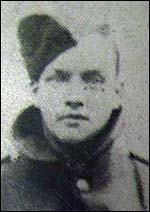 Missing Rushden Soldier Reported to be a Prisoner of War Missing Rushden Soldier Reported to be a Prisoner of War
Still another Rushden soldier who had been missing since the battles in France and Belgium is reported to be alive and a prisoner of war in Germany. He is Pte. William Smith, of the 2nd Wiltshire Regiment, and his wife, who resides at 26, St. Margaret’s-avenue, Rushden, had almost given up hope of his survival.
She has had no message from him since May, and she was almost bewildered when the buff form dated October 19th arrived from the Infantry Record Office informing her of the War Office report that her husband is in Germany.
The message adds that the camp number is not yet known.
Twenty-nine years of age, Pte. Smith is the son of the late Mr. and Mrs. A. C. Smith of Duston, and has two children. He joined the Army in February, 1939, having at one time worked in the Rushden Urban Council Surveyor’s department.
|
|